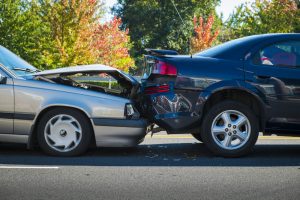Virginia Attorneys for Nerve Damage from Auto Accidents
 After experiencing a serious car accident, many people will automatically check themselves and their passengers for a variety of common injuries. Some of the most obvious ones to look for are signs of a concussion, bleeding, or broken bones. However, it may not occur to most people that nerve damage is also a common result of being in an automobile collision.
After experiencing a serious car accident, many people will automatically check themselves and their passengers for a variety of common injuries. Some of the most obvious ones to look for are signs of a concussion, bleeding, or broken bones. However, it may not occur to most people that nerve damage is also a common result of being in an automobile collision.
Because nerve pain is so easily overlooked, and because the symptoms may not be immediately apparent, many people who have suffered these injuries do not seek medical attention soon enough, if at all. Additionally, certain forms of nerve damage or pain can be very difficult to prove definitively, which sometimes makes it more challenging to seek compensation for these kinds of injuries.
The Virginia car accident lawyers of CHASENBOSCOLO understand the devastating impact nerve damage can have on your life. Whether or not your injury results in loss of function or paralysis, sometimes the pain alone can often make life feel unbearable. Our legal team has the experience and knowledge to help you recover the full compensation you deserve for the medical bills that result from the accident.
Call us today at (703) 538-1138 for a free, no-obligation case evaluation.
Common Car Accident Injuries That Result in Nerve Damage
Whether you were involved in a high-speed collision or a seemingly minor fender-bender, any automobile accident carries the risk of causing nerve pain or damage.
The human body has about seven trillion nerves. At the moment of a car collision, the impact can cause pinching, stretching, tearing, or other kinds of damage to any one of these nerves. Among other functions, nerves are responsible for sending pain signals to the brain. For this reason, damage to the nerves can cause long-term or even permanent problems for those who were injured, including chronic pain.
A few of the most common car accident injuries that result in nerve pain include:
- Whiplash – Whiplash is an action that occurs when a collision suddenly jolts the head forward and then backward, resulting in spinal trauma. This kind of injury often affects the neck’s muscles, tendons, or other soft tissue, but it can also cause damage to the nerves.
- Impact on the spine – If there is an impact on your spine during the accident, the action can pinch or compress the nerves in your spine. The result of this can be pain, weakness, numbness, or tingling in your limbs. Sciatica, for example, is the result of this type of injury.
- Herniated disk – Vertebral disks are the rubbery cushions between your vertebrae. When one of these disks is damaged, or herniated, it can create a pinching or other form of interference with the nerves of the spinal cord. This can result in weakness, numbness, tingling, pain, or even paralysis. A herniated disk might heal on its own, but sometimes surgery is required.
- Secondary nerve injuries – Nerves throughout the body can suffer damage in a car accident as the result of broken bones, internal trauma, or lacerations.
Types of Nerve Damage
 Everyone has experienced nerve pain at some point, whether in the form of a pinched nerve from a sports injury or simply from sleeping in a sub-optimal position. These kinds of minor nerve injuries often heal on their own or after a massage, stretching, or applying heat.
Everyone has experienced nerve pain at some point, whether in the form of a pinched nerve from a sports injury or simply from sleeping in a sub-optimal position. These kinds of minor nerve injuries often heal on their own or after a massage, stretching, or applying heat.
The kinds of nerve injuries that result from a car accident can be far more severe. The impact of a collision might stretch or even tear your nerves, among other forms of serious injury. Such injuries generally fall into three basic categories, which can range from first- to fifth-degree severity.
- Neurapraxia – Neurapraxia is the mildest form of nerve damage. It happens when a nerve gets compressed or stretched. It usually resolves on its own after a few days or months, only requiring rest, massage, or other at-home treatments.
- Axonotmesis – This form of damage is characterized by damage to the axons (the part of the nerve that sends messages to other nerves) and their myelin sheath (the protective covering of the axons). A person with this kind of injury can expect to fully recover after six months to a year, albeit with the help of physical or occupational therapy.
- Neurotmesis – This is the most severe variety of nerve damage and occurs when the nerve is fully severed. This kind of injury usually occurs because of a violent laceration and generally requires immediate surgical intervention. However, while surgery can help the victim somewhat, they cannot usually expect the nerves to make a complete recovery.
Symptoms of Nerve Damage
Injuries from car crashes often cause their victims to feel pain of all kinds. This can make it hard to distinguish nerve damage from the pain that comes from broken bones or other injuries. If you notice any of the following symptoms, however, you should seek medical attention right away:
- Numbness in arms, legs, hands, or feet
- Throbbing, jabbing, or burning pain
- Muscle weakness
- Hypersensitivity to temperature or touch
- Unexplained pain during moments of rest or sleep
- Lack of coordination, including falling
- Paralysis
- Excessive sweating or inability to sweat
- Digestive problems
- Sudden blood pressure drops
Some of these symptoms may come from other injuries you sustained in the accident, but they may also indicate nerve damage. Regardless, if you experience any of these symptoms, you should seek medical attention as soon as you can so that you can reduce the risk of permanent nerve damage.
Contact a Virginia Car Accident Attorney Today
Sadly, it can take months or even years to recover from nerve damage after a car crash. This can make it difficult to work and can lead to overwhelming medical expenses as well. Fortunately, the Virginia car accident attorneys at CHASENBOSCOLO have the knowledge and experience you need to help you through this challenging time.
Our seasoned legal team will fight for your best interests and put all our resources behind recovering the full compensation you deserve. Call us today at CHASENBOSCOLO for a free, no-obligation case evaluation. We are here to discuss your legal options and will give you our compassionate support every step of the way.





